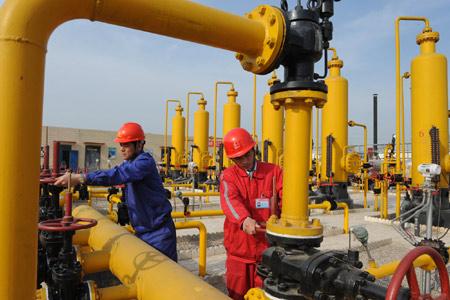
Workers inspect natural gas equipment at a Sinopec facility in Hebei province. Spending by Chinese companies on mining and energy acquisitions reached a record $32 billion last year.[China Daily]
HOUSTON - China Petrochemical Corp agreed to pay ConocoPhillips $4.65 billion for its stake in Syncrude Canada Ltd, a higher price than analysts expected, as Asia's biggest refiner seeks overseas petroleum reserves.
China Petrochemical, the Beijing-based company known as Sinopec Group, will buy about 9 percent of oil-sands producer Syncrude through its unit Sinopec International Petroleum Exploration & Production Co, according to a statement issued by Houston-based ConocoPhillips on Monday.
The price the group agreed to pay for Syncrude surpassed by $650 million the high end of an estimate by Macquarie Securities of the assets' worth, said Jason Gammel, an analyst in New York with the firm.
ConocoPhillips received a premium of about 20 percent compared with the value implied last week by Canadian Oil Sands Trust's market worth, debt and cash, according to a research note from Raymond James.
"What it reflects is China's insatiable appetite for resource accumulation overseas, not to mention the fact that Beijing has a pretty big checkbook," said Pavel Molchanov, an analyst with Raymond James who rates ConocoPhillips at "underperform" and doesn't own any of its shares. Molchanov said he thought the stake would fetch about $4 billion.
Canadian Oil Sands Trust is the lead partner in Fort McMurray, Alberta-based Syncrude with a 36.7 percent interest.
ConocoPhillips, the third-largest US oil company, said in October it planned to sell $10 billion of assets over two years to help cut debt.
Oil sands are deposits of bitumen, an extra-heavy oil that must be treated for use in refineries to produce gasoline and diesel fuels.
The Syncrude deal shows the Chinese are putting prices on resources out of line with criteria such as the rate of return, said Mark Gilman, an analyst at the Benchmark Co in New York who has a "hold" rating on ConocoPhillips shares and owns none.
"You don't need a degree in rocket science to come up with the fact that this is more than twice its economic value," he said of the Syncrude transaction.
Spending by Chinese companies on mining and energy acquisitions reached a record $32 billion last year.
China, South Korea, Japan and India are seeking overseas resources to drive their economies. The International Energy Agency on March 12 raised its forecast for fuel demand in developing countries, led by China and India, to 41.2 million barrels a day and cut its prediction for Europe and the United States.
Asset race
State-controlled PetroChina Co won approval from the Canadian government in December to buy a stake in Athabasca Oil Sands Corp's MacKay and Dover oil-sands projects for C$1.9 billion ($1.9 billion).
Sinopec Group bought Calgary-based Addax Petroleum Corp for C$8.3 billion last year to add oil reserves. The group's Hong Kong-listed unit, China Petroleum & Chemical Corp, said on March 29 it will pay $2.5 billion to buy a stake in an Angolan field from its parent to boost crude-oil production.
In the race for assets, Indian companies typically won't overpay, said Robbert Van Batenburg at Louis Capital Markets in New York.
The Chinese economy grew 10.7 percent in the fourth quarter, the fastest pace since 2007, and is forecast by the United Nations to advance about four times more quickly than the US this year.
China, the world's largest energy consumer behind the US, relied on imports to meet more than half of its oil needs last year. The country's dependency on imported crude will continue to rise, PetroChina Chairman Jiang Jiemin said last month.
Annual domestic oil production is unlikely to exceed 200 million tons by 2020 while demand may increase to about 600 million tons by then, according to Jiang.
Debt at ConocoPhillips ballooned after Chief Executive Officer Jim Mulva agreed to buy Burlington Resources Inc in December 2005, the day before gas prices hit a record at $15.78 per million British thermal units. The deal closed for a purchase price of $36 billion in 2006.
Mulva said in March that he expects half of the company's planned $10 billion in asset sales to be completed this year. ConocoPhillips said the sale of the Syncrude stake, which requires Canadian and Chinese government approvals, is expected to close in the third quarter.
Government review
Canadian Prime Minister Stephen Harper said the government will review Sinopec Group's agreement to buy ConocoPhillips's stake in Syncrude. "I don't have any immediate reaction, but as you know we have various approval processes in Canada for foreign takeovers," Harper told reporters in Washington.
Canadian Oil Sands Trust climbed about 5 percent in trading on Monday in Toronto.
Other partners in the venture include Imperial Oil Ltd, Suncor Energy Inc, Murphy Oil Corp, Nexen Inc and Nippon Oil Corp's Mocal Energy Ltd.
Credit Suisse Group AG and Osler, Hoskin and Harcourt advised ConocoPhillips. Deutsche Bank AG was financial adviser to Sinopec Group.
ConocoPhillips rose 64 cents, or 1.2 percent, to $55.96 on Monday in New York Stock Exchange composite trading. The shares have gained 40 percent in the last 12 months. American depositary receipts of China Petroleum dropped 93 cents, or 1.1 percent, to $84.93.
BLOOMBERG NEWS





